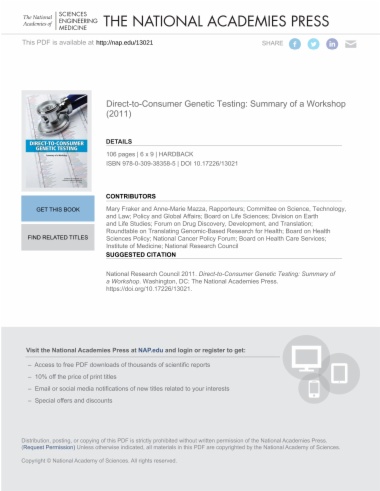

Today, scores of companies, primarily in the United States and Europe, are offering whole genome scanning services directly to the public. The proliferation of these companies and the services they offer demonstrate a public appetite for this information and where the future of genetics may be headed; they also demonstrate the need for serious discussion about the regulatory environment, patient privacy, and other policy implications of direct-to-consumer (DTC) genetic testing.
Rapid advances in genetic research already have begun to transform clinical practice and our understanding of disease progression. Existing research has revealed a genetic basis or component for numerous diseases, including Parkinson's disease, Alzheimer's disease, diabetes, heart disease, and several forms of cancer. The availability of the human genome sequence and the HapMap, plummeting costs of high-throughput screening, and increasingly sophisticated computational analyses have led to an explosion of discoveries of linkages between patterns of genetic variation and disease susceptibility. While this research is by no means a straight path toward better public health, improved knowledge of the genetic linkages has the potential to change fundamentally the way health professionals and public health practitioners approach the prevention and treatment of disease. Realizing this potential will require greater sophistication in the interpretation of genetic tests, new training for physicians and other diagnosticians, and new approaches to communicating findings to the public. As this rapidly growing field matures, all of these questions require attention from a variety of perspectives.
To discuss some of the foregoing issues, several units of the National Academies held a workshop on August 31 and September 1, 2009, to bring together a still-developing community of professionals from a variety of relevant disciplines, to educate the public and policy-makers about this emerging field, and to identify issues for future study. The meeting featured several invited presentations and discussions on the many technical, legal, policy, and ethical questions that such DTC testing raises, including: (1) overview of the current state of knowledge and the future research trajectory; (2) shared genes and emerging issues in privacy; (3) the regulatory framework; and (4) education of the public and the medical community.